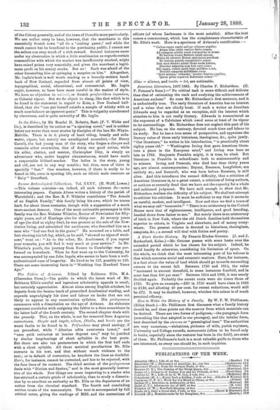The Fables of Avianus. Edited by Robinson Ellis, M.A. (Clarendon
Press.)—The public to which the latest work of Mr. Robinson Ellis's careful and ingenious scholarship appeals is small, but certainly appreciative. Almost alone among English scholars, he departs from the beaten track of prescribed Academical reading, and expends ungrudgingly his time and labour on books that are not likely to appear in any examination syllabus. His prolegomena commence with a dissertation on the age of Avianus. An elaborate argument concludes with assigning the fables to a date somewhere in the latter half of the fourth century. The second chapter deals with the prosody. This, on the whole, is not far removed from Augustan correctness. Dispdr and impar, nolam, fdbella, and hwas are the worst faults to be found in it. PrOundens may plead analogy, if not precedent, while "Altering odiis exsaturata tamet," and " nam petit extinctns at lumina degeret nub," may be justified by similar lengthenings of short syllables in the best poets. But there are also ten pentameters in which the first half ends with a short syllable. All these metrical peculiarities Mr. Ellis corrects in his text, and that without much violence to the text ; or in default of correction, he brackets the lines as doubtful. Here's, for instance, cannot be corrected, and has to be rejected, with the four lines of its context. The third section of the prolegomena deals with "Diction and Syntax," and is the most generally instruc- tive of the whole. Few things are more improving to a reader who has attained a certain grade of scholarship, than to study a disserta- tion by so excellent an authority as Mr. Ellis on the departures of an author from the classical standard. The fourth and concluding section treats of the manuscripts. The text is accompanied by fall critical notes, giving the readings of MSS. and the corrections of
editors (of whom Lachmann is the most notable). After the text comes a commentary, which has the completeness characteristic of Mr. Ellis's work. Here is a specimen of Avianas's versification :
"Calves &pies capiti solitns religare capillos
Atque alias undo vertice [erre comas, Ad campum nitidis venit conspectus in armis Et faellem frenis flectere ccepit equum. Ruins ab adverso Boron spiramina prinfiant Rijeulum popnlo conspiciente cepa. lain max deject° nitnit from nada gatero. Discolor adposita gum fait ante coma. Me saga; tantis (plod rims millibn.s esset, Distulit ammota ealliditate bows. • Quid mirnm,' referees, • positos fugisse capillos, Quern prins siqusevas desernere "
Alias = alienas, and tantis = tot, are noticeable.


















































 Previous page
Previous page